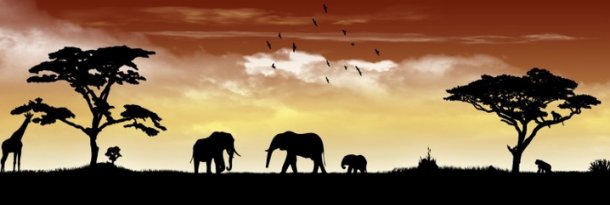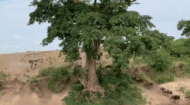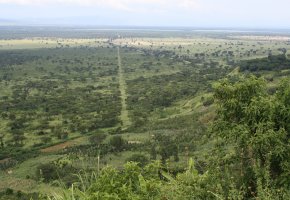|
One of the most thrilling aspects of an African safari is the sheer diversity and abundance of wildlife. You'll be amazed by what animals you will see, ranging from the smallest antelopes to the largest land mammals. The ultimate safari goal for many is to spot the "Big Five": the lion, leopard, elephant, rhino (black and white), and African buffalo. These magnificent creatures were historically considered the most dangerous for hunters to face on foot, and spotting all five is a badge of honour for any safari-goer. Beyond the Big Five, your eyes will feast on a parade of iconic African wildlife:
Giraffes gracefully browsing tall acacia trees, their long necks reaching for the highest leaves.
Zebras grazing in striking black and white stripes often mingling with wildebeest in vast herds.
Hippopotamuses wallowing in rivers and lakes, their powerful jaws capable of incredible yawns.
Crocodiles lurking silently in the water, ancient predators waiting for their moment.
Elegant antelopes of all shapes and sizes, from the agile impala to the majestic kudu.
Fleet-footed cheetahs stalking their prey, masters of speed.
The rare and elusive African wild dog, known for their incredible hunting prowess and unique pack dynamics.
A kaleidoscope of birdlife, from vibrant lilac-breasted rollers to majestic martial eagles. Each game drive is a new adventure, a fresh opportunity to witness raw nature unfold. You might see a lion pride lounging after a kill, a leopard camouflaged perfectly in a tree, or an elephant herd bathing at a waterhole. The unpredictability is part of the magic.
Proper preparation is key to ensuring a smooth, safe, and enjoyable safari experience. Here’s how to prepare for your incredible journey:
1. Timing is Everything: Dry Season (May/June to October): Generally considered the best time for game viewing as vegetation is sparse, and animals congregate around water sources, making them easier to spot. The weather is cooler and drier. This is peak season, so book well in advance. Wet/Green Season (November to April): Lush landscapes, fewer tourists, lower prices, and excellent birdwatching. Calving season for many species presents opportunities to see young animals. However, some roads may be challenging, and the game can be more dispersed.
2. Choose Your Tour Operator Wisely: Research reputable safari operators based on their track record, safety standards, ethical practices (conservation and community involvement), and reviews. A good operator will help tailor your itinerary, handle logistics, and provide experienced guides.
3. Health and Safety: Vaccinations: Consult your doctor about required and recommended vaccinations (e.g., Yellow Fever, Tetanus, Hepatitis A & B, Typhoid). Malaria Prevention: Many safari areas are malaria zones. Discuss prophylaxis options with your doctor. Use insect repellent with DEET, sleep under mosquito nets (often provided by lodges), and wear long sleeves and trousers at dawn/dusk. First Aid Kit: Pack essential medications, pain relievers, allergy medication, antiseptic wipes, and band-aids. Travel Insurance: Comprehensive travel insurance covering medical emergencies, evacuation, and trip cancellation is non-negotiable.
4. What to Pack: Clothing: Think layers! Lightweight, breathable, quick-drying clothing in neutral colours (khaki, olive green, tan, brown) to blend in and avoid attracting insects. Long sleeves and trousers for sun protection and insect bite prevention. A warm fleece or jacket for chilly mornings and evenings. Rain gear. Footwear: Comfortable walking shoes or hiking boots, and sandals for around camp. Essentials: Wide-brimmed hat, sunglasses, high-SPF sunscreen, insect repellent, headlamp/flashlight, power bank, universal adapter. Photography Gear: Binoculars are essential for optimal viewing. A good camera with a telephoto lens (200-400mm) will enhance your wildlife photography. Pack extra batteries and memory cards.
5. Visa and Documentation: Check visa requirements for your nationality well in advance. Some countries offer e-visas, while others require applications through embassies. Ensure your passport is valid for at least six months beyond your intended departure date and has sufficient blank pages. Keep copies of all important documents (passport, visa, flight tickets, insurance) both physically and digitally.
6. Safari Etiquette: Listen to Your Guide: They are experts in the bush, and your safety is their priority. Follow all instructions. Respect Wildlife: Maintain a safe distance. Never feed animals or make loud noises that could disturb them. Stay in the Vehicle: Unless explicitly told otherwise by your guide during a walking safari, always remain inside the safari vehicle. Leave No Trace: Do not litter. Take only photographs, leave only footprints. Respect Local Culture: Dress modestly, especially when visiting local communities. Ask permission before taking photos of people.
An African safari is an investment in an experience that transcends the ordinary. By understanding the best destinations, anticipating what animals you will see, and preparing diligently with how to prepare guidelines, you set the stage for an adventure that will forever redefine your connection with the wild. Get ready to embark on a journey of discovery, wonder, and unforgettable moments beneath the vast African sky.
|








